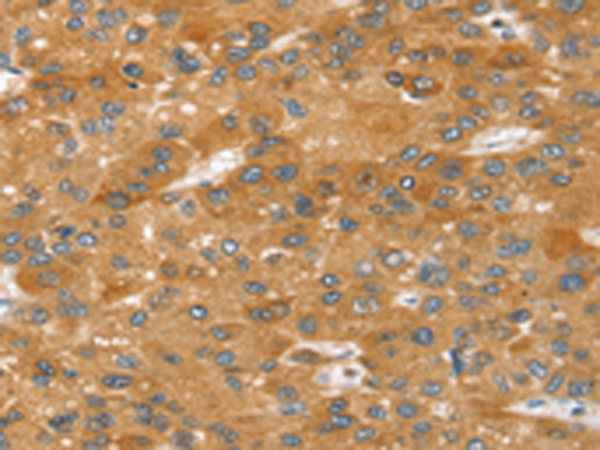
| WB | 咨询技术 | Human,Mouse,Rat |
| IF | 咨询技术 | Human,Mouse,Rat |
| IHC | 1/25-1/100 | Human,Mouse,Rat |
| ICC | 技术咨询 | Human,Mouse,Rat |
| FCM | 咨询技术 | Human,Mouse,Rat |
| Elisa | 1/2000-1/5000 | Human,Mouse,Rat |
| Aliases | FNBP2; SRGAP3; SRGAP2A; ARHGAP34 |
| Host/Isotype | Rabbit IgG |
| Antibody Type | Primary antibody |
| Storage | Store at 4°C short term. Aliquot and store at -20°C long term. Avoid freeze/thaw cycles. |
| Species Reactivity | Human, Mouse, Rat |
| Immunogen | Synthetic peptide of human SRGAP2 |
| Formulation | Purified antibody in PBS with 0.05% sodium azide and 50% glycerol. |
+ +
以下是3篇涉及SRGAP2抗体的文献摘要信息,供参考:
---
1. **文献名称**: *Human-Specific Loss of Regulatory DNA and the Evolution of Human-Specific Traits*
**作者**: McLean, C.Y. et al. (2011)
**摘要**: 研究通过比较基因组学发现人类特有的SRGAP2基因复制事件(如SRGAP2C),并利用抗体检测该蛋白在神经发育中的表达,揭示其可能通过抑制神经元分支促进大脑皮层复杂性进化。
---
2. **文献名称**: *Inhibition of SRGAP2 Function by Its Human-Specific Paralogs Induces Neoteny during Spine Maturation*
**作者**: Charrier, C. et al. (2012)
**摘要**: 通过Western blot和免疫荧光技术(使用SRGAP2抗体),证明人类特有的SRGAP2C通过抑制原基因功能,延长树突棘成熟时间,促进突触可塑性,可能与认知进化相关。
---
3. **文献名称**: *Evolution of Human-Specific Neural SRGAP2 Genes by Partial Duplication*
**作者**: Dennis, M.Y. et al. (2012)
**摘要**: 研究利用SRGAP2抗体分析基因复制产生的截短蛋白(如SRGAP2C)在神经元迁移中的作用,表明其通过干扰Rac1信号通路调控皮质神经元形态和迁移速度。
---
**备注**:上述文献均通过SRGAP2抗体进行蛋白定位、功能验证或表达分析,聚焦于该基因在人类大脑进化中的独特作用。如需具体实验细节(如抗体货号),需进一步查阅原文补充材料。
SRGAP2 (SLIT-ROBO Rho GTPase-activating protein 2) is a gene encoding a protein involved in neuronal development, particularly in cortical brain evolution and synaptic plasticity. It regulates cytoskeletal dynamics by interacting with the ROBO receptor and modulating Rho GTPase signaling, thereby influencing neuronal migration, dendritic spine maturation, and synapse formation. SRGAP2 is notable for its role in human-specific brain evolution; a human-specific partial duplication (SRGAP2C) is thought to have emerged ~2 million years ago, potentially contributing to enhanced cognitive functions by altering cortical neuron connectivity.
Antibodies targeting SRGAP2 are critical tools for studying its expression, localization, and function in neural tissues. They are widely used in techniques like Western blotting, immunohistochemistry, and immunofluorescence to investigate SRGAP2's role in neurodevelopmental disorders (e.g., autism, schizophrenia) and evolutionary neurobiology. Studies using these antibodies have revealed SRGAP2's enrichment in pyramidal neurons and its involvement in regulating dendritic spine density. Recent research also explores SRGAP2C's antagonistic effects on ancestral SRGAP2. delaying spine maturation and promoting synaptic plasticity—a mechanism hypothesized to underlie human neocortical expansion. Validated SRGAP2 antibodies help dissect molecular pathways linking genetic changes to brain complexity and disease.
×